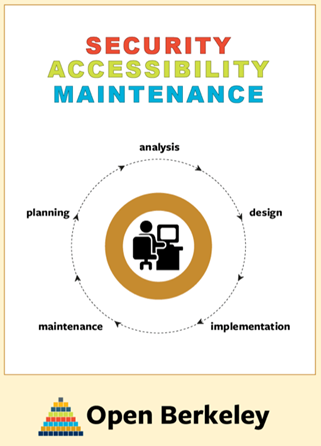By Tom Tsai, Senior Manager, Architecture Platforms & Integration, UC Berkeley. In this interview, Bill Allison, Chief Technology Officer at UC Berkeley, shares his experience rolling out a web platform solution for UC Berkeley campus websites. Campus employees with no prior web experience can use Open Berkeley’s powerful toolset to easily build sophisticated websites, and customers can rely on Open Berkeley to provide solutions to ongoing security, accessibility, and maintenance issues.
How did Open Berkeley begin?
As websites transitioned from simple static HTML sites to more complex dynamic sites, campus teams started looking at content management systems like Drupal and WordPress. Many of these teams did not have the time, resources, or technical skills to build, host, and maintain their websites, so we recognized a need for a campus-wide web platform solution. We started the project as a pilot co-sponsored by central IT, the Office of the Chancellor, and the Vice Chancellor for Administration and Finance.
What are the “campus-specific needs?”
At UC Berkeley, the functional “site owners” are often managers or communication staff who have full plates, limited resources, and sometimes limited experience with the technical side of websites. Open Berkeley allows campus employees with no prior web experience to build flexible websites with Berkeley branding.
What are the key benefits of Open Berkeley?
When we started looking at various campus websites, we realized that campus teams not only needed assistance with building and launching their websites, but also with ongoing security, accessibility, and maintenance.
From a security standpoint, the Open Berkeley team has applied best practices in configuration, authentication, and monitoring, which allow quick patching of any security vulnerabilities.
On the accessibility side, the Open Berkeley team built the platform with accessibility in mind, supporting the UC wide policy that campus websites must be accessible to all members of the campus community, including those with disabilities. Accessibility is part of our development process, and any new features are vetted for accessibility before they are deployed. Accessibility tips and tricks for content creators are also included in Open Berkeley training and documentation.
And, of course, there’s the benefit that everyone cares about – low cost. In our experience, most teams radically underestimate the ongoing cost associated with website maintenance. Open Berkeley provides a highly cost-effective solution when compared to do-it-yourself maintenance costs or hiring external vendors.
Describe the ongoing development and maintenance of Open Berkeley.
The Open Berkeley team continuously improves the operational and maintenance side, including critical automation work that allows the platform to scale and enables rapid deployment of security releases and platform upgrades.
One of unique aspects of our platform model is the concept of sponsored features, where a campus team sponsors new functionality and drives the requirements but allows us to roll the functionality back into the platform. With sponsored features, all campus websites benefit!
The team also used Open Berkeley to implement the campus IT Service Catalog, which was integrated into the Office of the CIO website, successfully launched in December 2016.
Why did you choose the name “Open Berkeley?”
At our campus, the platform is “open” to any campus website as part of our managed platform service. We wanted to embrace the spirit of open source culture while shifting the paradigm to making an easy-to-use tool that is open for everyone at Berkeley to use – without technology as a barrier.
Will you be offering the platform to other locations?
Funny that you ask! Last month we had a very successful meeting among many of the teams running Drupal web services across the UC. We compared notes on the challenges and opportunities we’ve seen with Open Berkeley with our peers from UCLA, UC Davis, UCSF and systemwide CIO Tom Andriola. One of the discoveries from our meeting is that each of our teams is spending a significant amount of time on outreach, onboarding new sites, and brokering outside help as campus units begin to envision what they want their websites to do. We will be actively working together to develop and share common practices and technology to improve security and accessibility through our Drupal services.
For more information, reach out to @billallison on Twitter.


This is a great service! Great job!